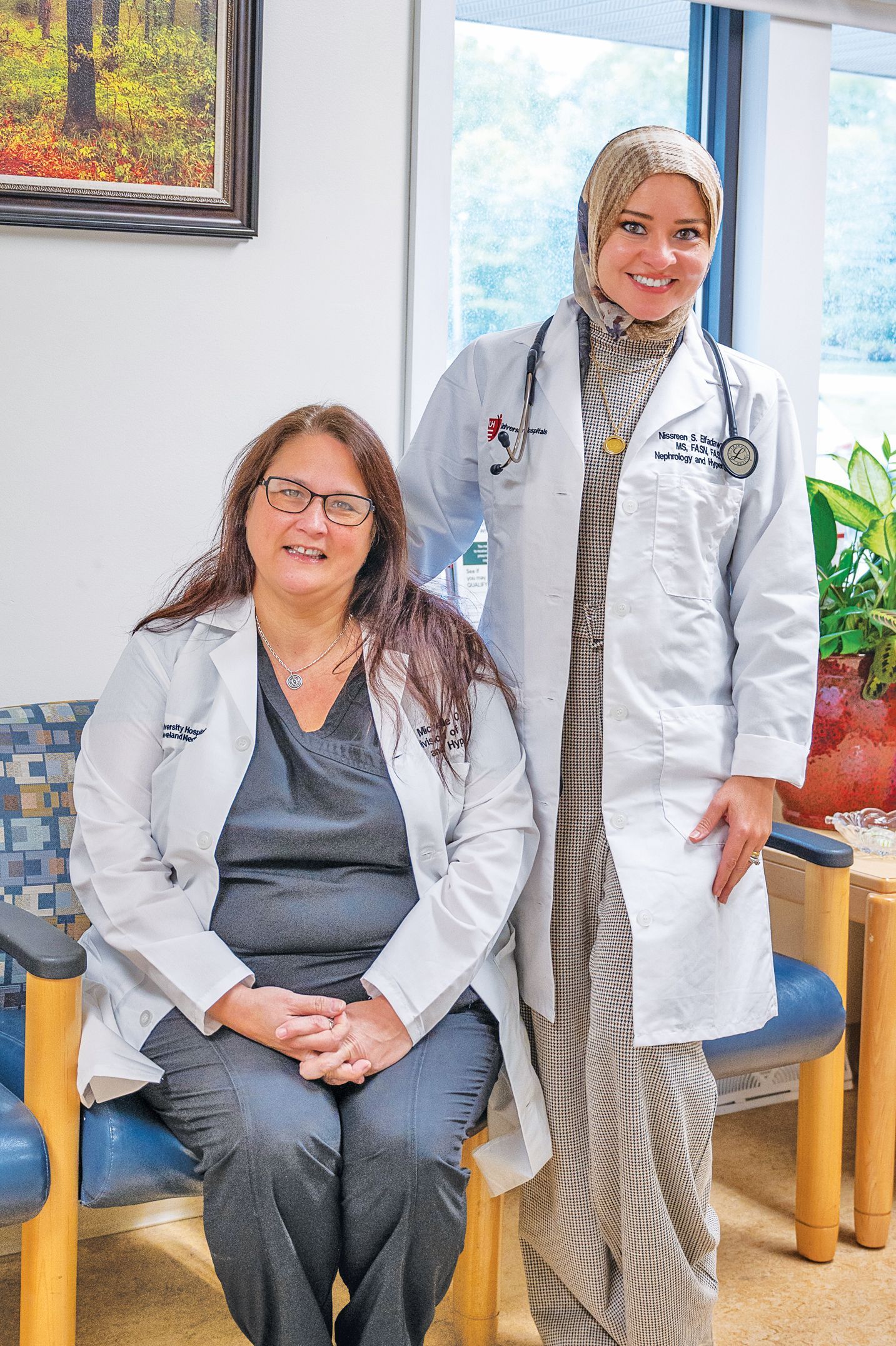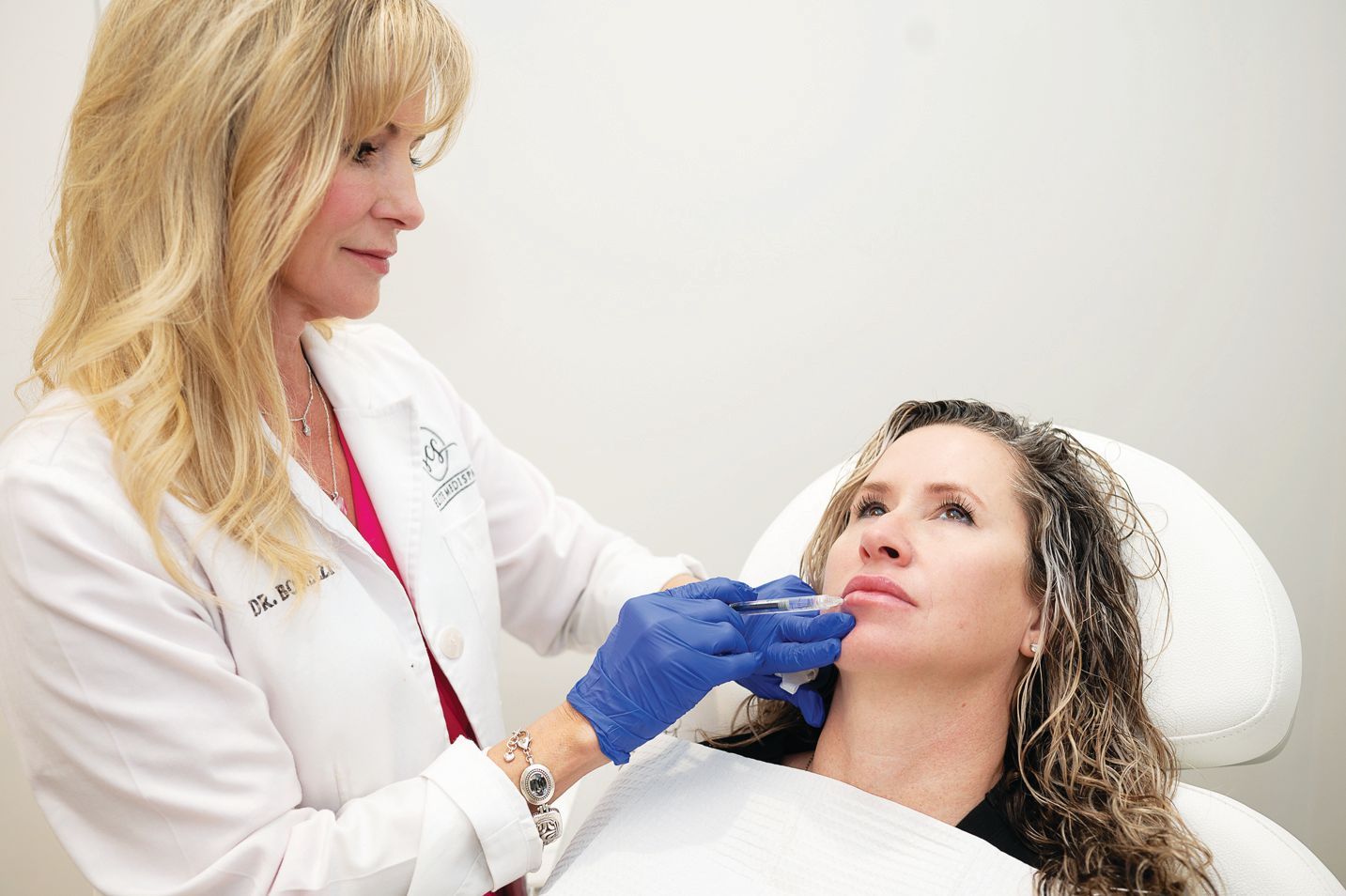Treating gout
University Hospitals Geauga Medical Center features a new gout clinic in Chardon.

(R) Nissreen Elfadawy, MD, a Nephrologist at University Hospitals Geauga Medical Center, and (L) Michelle Otto, CMA, Practice Lead and Kidney Care Navigator, are helping patients find relief from the symptoms of gout. (Photography: Adrienne Rose)
Once associated with kings who overindulged in rich foods and wine, hence the nickname “the disease of kings,” today gout is a form of inflammatory arthritis and a chronic systemic disorder that anyone can get, though men are still twice as likely to develop this painful disease.
Rich foods and drinks are a factor in developing gout, as red meat, shellfish, sugary drinks and alcohol are high in purines, substances that the body converts into uric acid. This elevated level of uric acid can lead to the formation of urate crystals in the joints, resulting in painful bouts of gout.
“Although Diet and lifestyle are important factors in developing Gout, there are other more important factors like genetic predisposition and failure of the kidney to get rid of the uric acid from the blood,” says Nissreen Elfadawy, MD, a Nephrologist at University Hospitals Geauga Medical Center, a campus of UH Regional Hospitals. “Gout symptoms can be treated by rheumatologists, but nephrologists approach it more as a chronic systemic disease as it is often associated with other health conditions, such as kidney disease, diabetes and hypertension. Instead of treating the symptoms, we treat the root cause of why the kidneys are not getting rid of the uric acid.”
While gout usually affects the big toe, Dr. Elfadawy says it can occur in any joint, such as the ankles, knees, elbows, wrists and fingers, as well as in the ears.
“More than 12 million people in the United States have gout, but only about 3 million are being treated,”
Dr. Elfadawy says. “Gout is both undertreated and underdiagnosed, as patients only seek treatment if they have flare-ups, so we are trying to bring attention to this chronic disease and have opened a specialty gout clinic.”
New Specialty Gout Center
Opened this fall, the Chardon clinic is open a half-day every month, where the total focus is on gout. “When someone has gout, it is very painful. We want to provide quick access to care and a place patients can come for expert treatment,” she says.
Many of the symptoms of gout are similar to other health conditions, so it is important to be evaluated by a physician. Symptoms often occur without warning and can come and go. The most common are:
- Severe, sudden pain in one or more joints, often in the big toe.
- Skin that is red or purple, tight, and shiny over the joint.
- Swollen joints.
- Warmth in the joint area.
- Nonfunctioning joint that makes it hard to walk.
- Hard lumps of uric acid crystal deposits under the skin (tophi).
“Sometimes gout is asymptomatic, or the flare-ups come and go,” Dr. Elfadawy says. “It is vital, however, that we treat gout as it also can affect the kidneys and heart. There are many types of medications we prescribe to both address the pain of symptoms as well as help eliminate uric acid through the urine, or to shut down the production of uric acid.
One of the newest treatments for advanced cases is an infusion using Krystexxa, a medicine that eliminates the uric acid from the body rapidly and effectively.
“The important thing is to seek treatment,” says Dr. Elfadawy, whose approachable and caring demeanor has earned her five-star ratings by patients. “We make it convenient, with specialized care close to home.”
Call 440-869-5692 to schedule an appointment. UH Geauga Medical Center is located at 13207 Ravenna Road, in Chardon. The gout clinic is located at 13221 Ravenna Rd., Suite 12 in Chardon. For more information, visit UHHospitals.org/Geauga.
Kidney Care, Close to Home
Ranked among the top hospitals for nephrology by U.S. News & World Report, University Hospitals provides care for the full spectrum of kidney disease, from early stage to advanced, at its regional Geauga Medical Center. The physicians and staff have expertise in:
- Chronic kidney disease
- Acute kidney injury
- Diabetic nephropathy
- Hypertension
- Kidney failure
- Polycystic kidney disease
- Glomerular diseases
- Kidney stones
- Kidney transplant aftercare
“This is the only University hospitals dedicated kidney clinic in Geauga County,” says Dr. Nissreen Elfadawy. “Our nephrology clinic and programs include onconephrology, which is specialized care for patients with cancer, and we now offer peritoneal dialysis. We make it convenient for patients to get expert care right here, without having to travel downtown to the main campus.”
Recent Posts
RELATED ARTICLES











